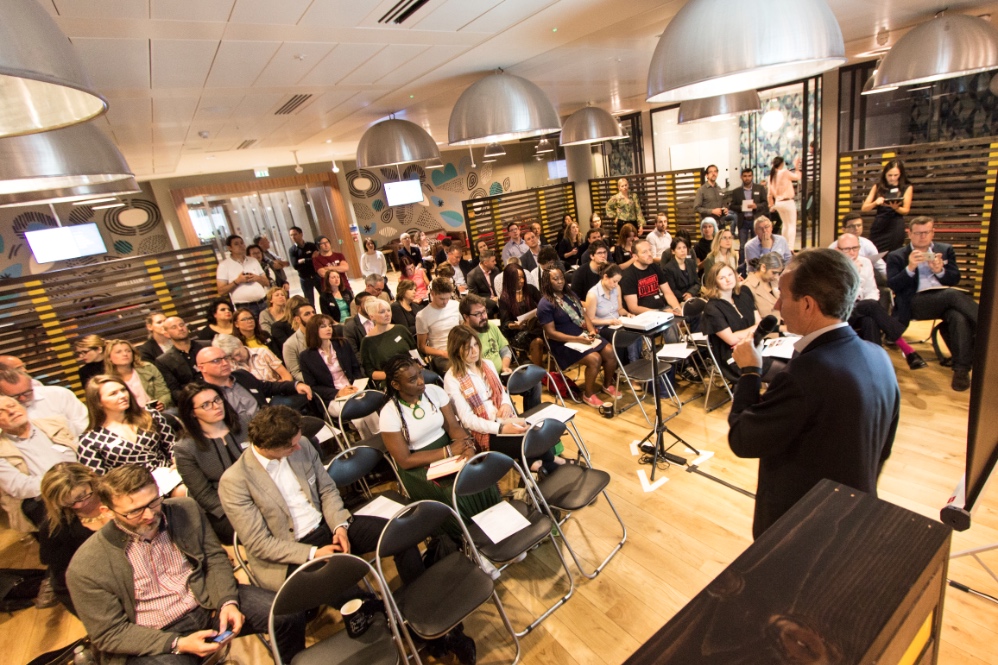The third Social Workplace Conference took place on Friday 10th June 2016 at WeWork Moorgate in London.
The morning session featured 9 separate presentations and a whirlwind tour of social workplace themes including office ‘uberisation’, psychology, design, agile culture and of course, communities. The afternoon sessions delved a little deeper into a selection of topics, including social media and the value (or lack thereof) that can be generated from workspace events.
OT was in attendance, and identified the following 4 key takeaways from the day’s discussions:
1) Who’s doing social workplaces?
Pier Mucelli of eOffice opened proceedings with an overview of the latest coworking and social workplace trends in London. While we’re all aware of the big players in coworking and serviced offices, of more interest was Pier’s summary of alternative brands coming onto the scene, including:
- TimberYard, an artisan coffee shop that actively welcomes desk workers to its space (without hiding the plug sockets).
- Incubators and open workspaces in establishments like the British Library and Imperial College.
- Branded technology accelerators by corporate giants, such as Mozilla Spaces, Google Campus, Cisco’s Idea London, Microsoft Venture, Rocket Internet, Founders Factory, and Cocoon Networks.
- A rise in members clubs and exclusive business clubs, such as 12 Hay Hill, Soho House, The Hospital Club, One Alfred Place, The ClubHouse, and Club Cafe Royal.
Pier drew attention to a number of traditional serviced office operators who are now managing large coworking spaces – including Regus’s Spaces, The Office Group, Pavillion, and Servcorp’s coworking space in Mayfair – as well as conventional landlords opening their own flexible workspaces.
The pace at which new operators are coming onto the scene – both from inside and outside the flexible workspace sector – is difficult to ignore. It’s not just a sign of a competitive market but also one that’s diversifying in new and innovative ways, and while it represents new challenges for existing operators, it’s also an encouraging indicator of a healthy, growing market.
2) WeWork is still growing… and growing…
For those who hadn’t yet peered inside a WeWork building, the conference at Moorgate offered an excellent opportunity to do just that.
 Held inside an open room lined with booths, with a vast kitchen at one end and a scattering of soft chairs at the other, it more or less lived up to expectations — particularly as the room was also home to a table football, ping-pong, a coffee machine (complete with its own barista) and the famous WeWork beer tap.
Held inside an open room lined with booths, with a vast kitchen at one end and a scattering of soft chairs at the other, it more or less lived up to expectations — particularly as the room was also home to a table football, ping-pong, a coffee machine (complete with its own barista) and the famous WeWork beer tap.
Back to the Conference, and WeWork’s European Partnerships Manager, Hillary Deppeler, explained that London is their fastest growing global market. So it’s no surprise that the company plans to launch its 11th London location within the next few weeks, with Paris, Berlin and Amsterdam also set to open soon.
“This growth marks a demographic shift and shows how people want to engage with others both at work and at home,” said Hillary, referring to the company’s co-living brand, WeLive. “There’s not really a line between work and life anymore, so we create spaces that are vibrant, connected, and efficient both for business as well as to inspire a happier life.”
 The power of WeWork’s branding is evident; and Hillary revealed that the company pulls on its community appeal as a marketing strategy. For instance, some firms hire out their meeting spaces to conduct reviews with WeWork members (such as tastings and promotional events), which goes some way towards demonstrating the value of WeWork’s own brand of workspace community.
The power of WeWork’s branding is evident; and Hillary revealed that the company pulls on its community appeal as a marketing strategy. For instance, some firms hire out their meeting spaces to conduct reviews with WeWork members (such as tastings and promotional events), which goes some way towards demonstrating the value of WeWork’s own brand of workspace community.
3) Workspace has found its place in the sharing economy
Peter Ames, Head of Strategy at OfficeGenie, talked about the ‘Uberisation’ of flexible workspace and how the industry has firmly taken its place in the sharing economy. ‘Uberisation’ comes from the company name Uber, and refers to the utilisation of computing platforms to enable peer-to-peer transactions between clients and providers.
‘Uberisation’ demonstrates how workspace has transitioned from a product into a service, meaning in some cases it can now be booked easily and seamlessly online.
 Of course we’re not there yet, and there’s still a gaping chasm between the lesser online efficiency of traditional workspaces and those that have fully embraced the sharing economy concept. Yet with the prevalence of third party booking systems and the development of online platforms by external suppliers, it’s now easier than ever before for workspace operators to hop onboard the peer-to-peer network.
Of course we’re not there yet, and there’s still a gaping chasm between the lesser online efficiency of traditional workspaces and those that have fully embraced the sharing economy concept. Yet with the prevalence of third party booking systems and the development of online platforms by external suppliers, it’s now easier than ever before for workspace operators to hop onboard the peer-to-peer network.
4) Events, dear boy, events…
During the afternoon workshop, Phil Dodson of WorkHubs challenged the efficiency of workspace events and questioned whether they’re a help or a hindrance to members.
The discussion quickly escalated with a decidedly split response. Some say the events scene has reached saturation point, and workspace events typically attract low turnouts with even lower conversion rates. Yet others firmly believe there is still a place for events, providing they are targeted and, where possible, attendee data is collected for future marketing campaigns.
Given the often high cost of new client acquisition, it was agreed that while events organised by coworking spaces are often loss-leaders, it is usually much more effective to market the physical event space itself and let existing members or external parties utilise the space for their own needs. In addition to revenue on event hire, this also serves the purpose of bringing new footfall to the coworking space.
As for Phil Dodson’s take on events, he follows the rule of 3 R’s: “If you’re going to hold an event, it should be Relevant, Risky, and aim to build Relationships.” Ultimately, events should add value to member relationships as well as external attendees, and keeping it relevant to their needs or interests is a fundamental requirement. As for the risk factor, this links to the problem of event saturation, and only by doing something a little different can operators stand out from the crowd.
Photos courtesy of Carsten Foertsch, Deskmag



 Dr. Gleb Tsipursky – The Office Whisperer
Dr. Gleb Tsipursky – The Office Whisperer Nirit Cohen – WorkFutures
Nirit Cohen – WorkFutures Angela Howard – Culture Expert
Angela Howard – Culture Expert Drew Jones – Design & Innovation
Drew Jones – Design & Innovation Jonathan Price – CRE & Flex Expert
Jonathan Price – CRE & Flex Expert












